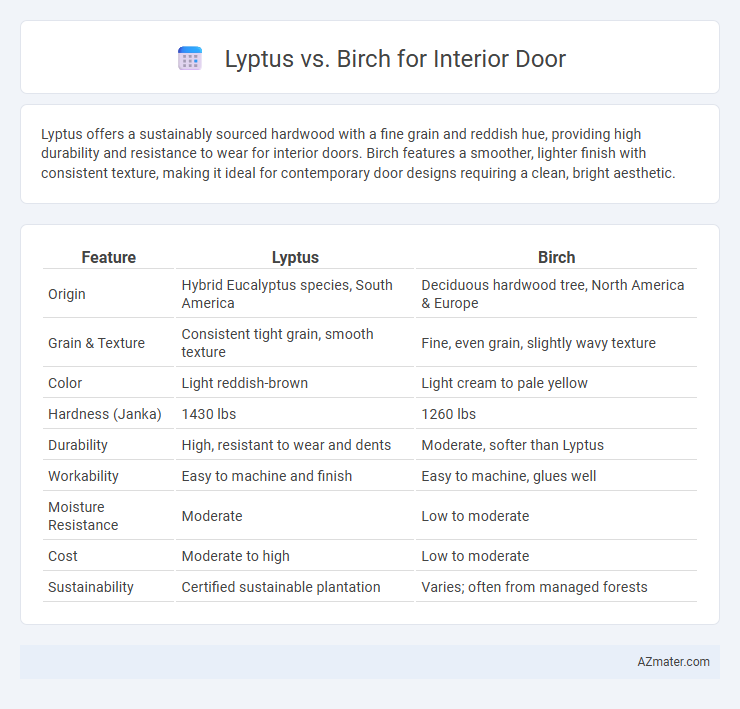Lyptus offers a sustainably sourced hardwood with a fine grain and reddish hue, providing high durability and resistance to wear for interior doors. Birch features a smoother, lighter finish with consistent texture, making it ideal for contemporary door designs requiring a clean, bright aesthetic.
Table of Comparison
| Feature | Lyptus | Birch |
|---|---|---|
| Origin | Hybrid Eucalyptus species, South America | Deciduous hardwood tree, North America & Europe |
| Grain & Texture | Consistent tight grain, smooth texture | Fine, even grain, slightly wavy texture |
| Color | Light reddish-brown | Light cream to pale yellow |
| Hardness (Janka) | 1430 lbs | 1260 lbs |
| Durability | High, resistant to wear and dents | Moderate, softer than Lyptus |
| Workability | Easy to machine and finish | Easy to machine, glues well |
| Moisture Resistance | Moderate | Low to moderate |
| Cost | Moderate to high | Low to moderate |
| Sustainability | Certified sustainable plantation | Varies; often from managed forests |
Introduction to Lyptus and Birch Wood
Lyptus is a fast-growing hybrid of Eucalyptus grandis and Eucalyptus urophylla, prized for its sustainability and uniform grain, making it an eco-friendly choice for interior doors. Birch wood, known for its fine grain and pale color, offers durability and smooth finishing, commonly used in cabinetry and door manufacturing. Both woods provide strong, attractive options, with Lyptus emphasizing sustainability and Birch offering classic hardwood appeal.
Key Differences Between Lyptus and Birch
Lyptus doors are made from a fast-growing eucalyptus hybrid known for its hardness and resistance to wear, offering excellent durability and stability for interior use. Birch, a hardwood prized for its fine grain and smooth texture, provides a softer surface that is easier to paint and finish, ideal for stylish, customizable interior doors. While Lyptus features superior density and natural resistance to dents, birch offers greater versatility in appearance due to its lighter coloration and consistent grain pattern.
Appearance and Grain Patterns
Lyptus wood features a smooth texture with a consistent, fine grain pattern that offers a modern, uniform appearance ideal for sleek interior doors. Birch presents a more varied grain with subtle swirls and occasional knots, providing a natural, warm look that enhances traditional and rustic door styles. Both woods can be stained or finished to highlight their unique grain characteristics, making them versatile options for diverse interior designs.
Durability and Hardness Comparison
Lyptus wood offers higher durability and hardness compared to Birch, making it a resilient choice for interior doors that endure daily wear and tear. With a Janka hardness rating around 1,410, Lyptus surpasses Birch's rating of approximately 1,260, providing stronger resistance to dents and scratches. This enhanced hardness ensures Lyptus doors maintain their structural integrity and aesthetic appeal longer in high-traffic areas.
Sustainability and Environmental Impact
Lyptus, a hybrid eucalyptus species grown on fast-growing plantations, offers a highly sustainable option for interior doors due to its rapid growth and minimal pesticide use, promoting responsible forestry practices. Birch, a traditional hardwood, often comes from slower-growing forests that may contribute to deforestation and higher carbon footprints when not sourced from certified sustainable forests. Choosing Lyptus supports reduced environmental impact by favoring renewable resources and efficient harvesting, while birch door selection requires verification of eco-friendly certifications like FSC to ensure sustainability.
Cost Considerations of Lyptus vs Birch
Lyptus wood is generally more expensive than birch due to its sustainable harvesting process and limited availability, impacting interior door cost. Birch offers a more budget-friendly option with wide availability and consistent quality, making it popular for cost-conscious projects. Choosing between Lyptus and birch depends on balancing upfront material costs with long-term value and aesthetic preference.
Workability and Finishing Qualities
Lyptus offers excellent workability due to its uniform grain and hardness comparable to oak, making it easy to cut, sand, and shape for interior doors. Birch provides smooth finishing qualities with its fine, even texture, allowing for a flawless paint or stain application that enhances the door's aesthetic appeal. Both woods respond well to common wood finishes, but Lyptus tends to hold its finish longer due to its denser fiber structure.
Maintenance and Longevity
Lyptus offers superior resistance to moisture and insect damage, reducing maintenance needs compared to birch, which is more prone to warping and requires frequent sealing or finishing. The hardness of Lyptus wood enhances its durability, resulting in doors that maintain their structural integrity longer than birch counterparts under similar conditions. Birch doors, while aesthetically pleasing, typically need regular upkeep to prevent wear and extend their lifespan, whereas Lyptus ensures a lower-maintenance option with greater longevity for interior door applications.
Best Applications for Interior Doors
Lyptus wood, known for its durability and smooth grain, is ideal for interior doors in high-traffic areas such as hallways and entryways, offering resistance to wear and a polished finish. Birch, with its fine texture and light color, excels in interior door applications where a clean, contemporary look is desired, making it suitable for bedrooms and living spaces. Both woods respond well to stains and paints, allowing customization for various interior design styles while maintaining structural integrity.
Choosing the Right Wood for Your Interior Door
Lyptus offers a sustainable, fast-growing eucalyptus alternative with a consistent grain and natural resistance to insects, making it ideal for eco-conscious interior door projects. Birch provides a fine, even texture and excellent strength, favored for its smooth finish and versatility in staining to match diverse interior styles. When choosing between Lyptus and Birch, consider durability, aesthetic preference, and environmental impact to ensure the best fit for your interior door needs.

Infographic: Lyptus vs Birch for Interior Door
 azmater.com
azmater.com